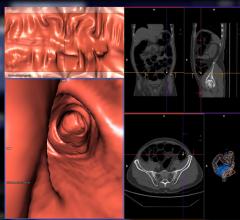
March 4, 2016 — A new guideline from the Canadian Task Force on Preventive Health Care recommends screening for colorectal cancer in asymptomatic, low-risk adults 50-74 years old biennially using fecal occult blood testing (FOBT), or flexible sigmoidoscopy every 10 years, rather than colonoscopy. The guideline was published in the Canadian Medical Association Journal (CMAJ).
Flexible sigmoidoscopy inserts a flexible scope to view the lower portion of the colon and rectum rather than the entire tract.
"Although colonoscopy may offer clinical benefits that are similar to or greater than those associated with flexible sigmoidoscopy, direct evidence of its efficacy from randomized controlled trials in comparison to the other screening tests ... is presently lacking; however, ongoing clinical trials are working to address this research gap," stated Maria Bacchus, M.D., chair of the guideline working group and a general internist in the Department of Medicine, University of Calgary, Alberta. "Wait lists for colonoscopy remain long in Canada and have increased over the years."
Colorectal cancer is the second most common cause of death from cancer in men and the third leading cause of death from cancer in women. In 2015, an estimated 25,000 Canadians were diagnosed with colorectal cancer, and approximately 9,300 died from this cancer.
The new guideline is based on the latest available evidence and updates the Task Force's previous 2001 guideline, which recommended FOBT every year or two years and flexible sigmoidoscopy every five years in asymptomatic adults.
"Although flexible sigmoidoscopy is not frequently performed for screening in many jurisdictions, it may warrant further consideration because it can be completed in the same facilities as colonoscopy and using similar equipment, but without the requirement of a specialist, such as a gastroenterologist," write the guideline authors.
The guideline recommends against screening people age 75 and over for colorectal cancer if they are asymptomatic. It also recommends against using colonoscopy as a primary screening tool for colorectal cancer. The authors recommend that physicians should discuss screening preferences, values and local test availability with patients between the ages of 50 and 59 years because of the lower incidence in this age group. It is also recommended that physicians have a similar conversation with those over age 75 because of their reduced life expectancy and the lack of randomized controlled trials showing benefit or potential harms to determine the best option.
The Canadian guideline is similar to the U.S. Preventive Services Task Force (USPSTF) recommendation, published in 2008, to screen adults aged 50 to 75 years with FOBT or flexible sigmoidoscopy. Although the USPSTF also recommended colonoscopy, the CTFPHC does not think there is sufficient evidence at this time to support this. Clinical trials are underway to address the role of colonoscopy as a screening tool.
For more information: www.canadiantaskforce.ca


 February 06, 2024
February 06, 2024 








